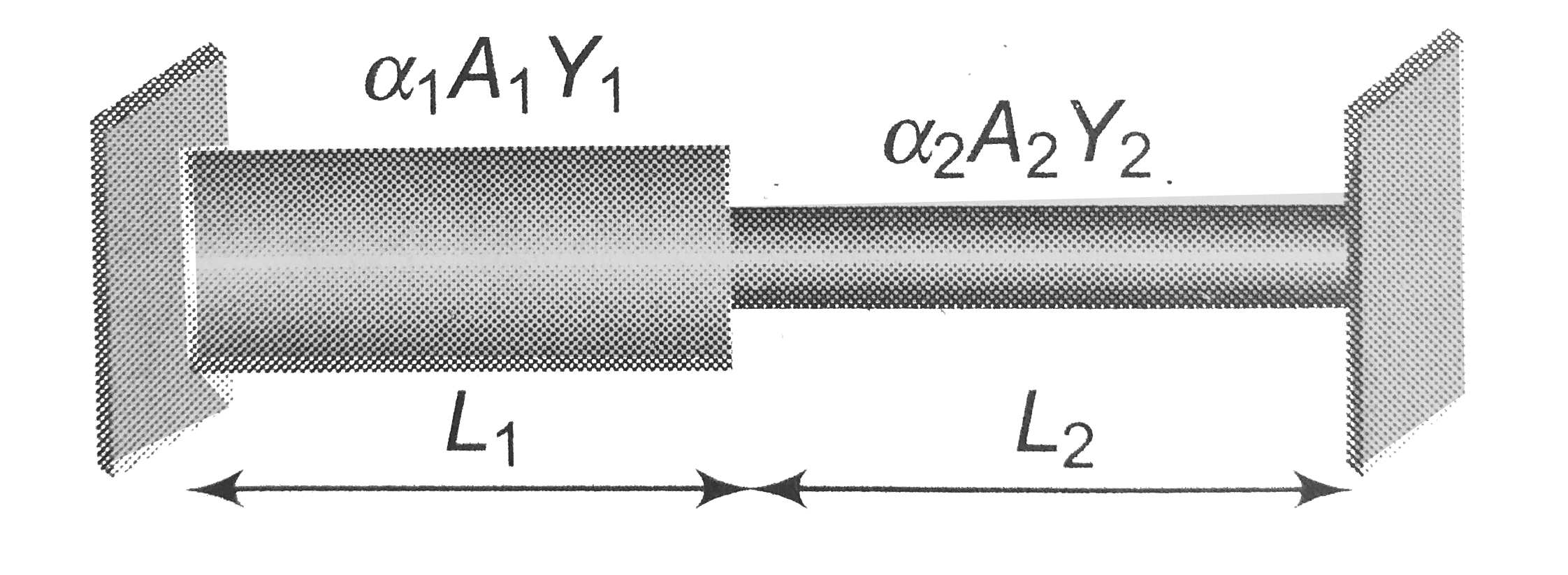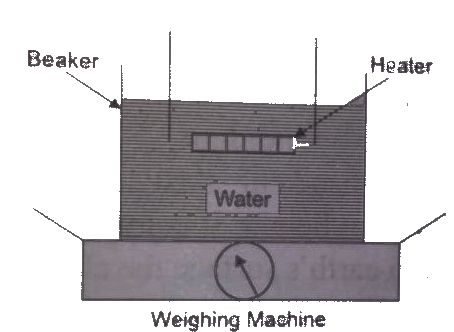Complete Solutions to Problems Baesd On Mixed Concepts of chapter THERMAL PROPERTIES OF MATTER of Class 11 book with complete answers and questions
| Class 11 | PHYSICS |
| Chapter | THERMAL PROPERTIES OF MATTER |
| A2Z | Problems Baesd On Mixed Concepts |
| Number Of Questions | 18 |
| Academic Year | 2023-24 |
Two wires `A` and `B` of the same cross sectional areas. Young's moduli `Y_(1)` and `Y_(2)` and coefficients of linear expansion `alpha_(1)` and `alpha_(2)` respectively are joined together and fixed between rigid supports at either ends. The tension in the compound wire when wire `A` is heated and wire `B` is cooled at different temperature is same when wire `A` alone is cooled at the same temperature as wire `B` earlier.
Find correct oprtion.View SolutionA piece of metal weighs 46 g in air and 30 g in lipuid of density `1.24 xx 10^3 kg m^(-3)` kept at `27^0C`. When the temperature of the liquid is raised to `42^0C` the metal piece weights 30.5 g . The density of the liqued at `42^0 C` is `1.20 xx 10^3 kg m^(-3)`. Calculate the coefficient of linear expandsion of the metal.
08:47View SolutionA small ball of mass `m` is dropped from an aeroplane moving at `50 m` height above the ground with a speed of `25 sqrt(2) "metre"//sec` if half of the mechanical energy of ball with respect to ground is lost as a thermal energy due to air friction. The change in the temperature of the ball as it lands on the ground is. specific heat capacity of ball is `56.25 J//kg`. `(g = 10 m//sec^(2))`
02:32View SolutionA current of `2.50` A passing through a heating coil immersed in `180 g` of paraffin (specific heat capacity `2.00 J g^(-1) K^(-1)`) contained in a `100 g` calorimeter (specific heat capacity `0.400 J g^(-1) K^(-1)`) raise the temperature from `5^(@)C` below room temperature to `5^(@)C` above room temperature in `100 s`. the reading of the voltmeter connected across the heating coil is
04:03View SolutionA simple seconds pendulum is constructed out of a very thin string of thermal coefficient of linear expansion `alpha = 20 xx 10^(-4)//^(@)C` and a heavy particle attached to one end. The free end of the string is suspended from the ceiling of an elevator at rest. the pendulum keeps correct time at `0^(@)C`. when the temperature rises to `50^(@)C`, the elevator operator of mass `60 kg` being a student of Physics accelerates the elevator vertically, to have the pendulum correct time. the apparent weight of the operator when the pendulum keeps correct time at `50^(@)C` is `("Take " g = 10m//s^(2)`)
06:05View SolutionAn insulated chamber at a height `h` above the earth's surface and maintained at `30^(@)C` has a clock fitted with an uncompensated pendulum. The maker of the clock for the chamber mistakenly design it to maintain correct time at `20^(@)C` at that height. it is found that if the chamber were brought to earth's surface the clock in it would click correct time at `30^(@)C`. the coefficient of linear expansion of the material of pendulum is (earth's radius is R)
04:58View SolutionTwo rods are joined between fixed supports as shown in the figure. Condition for no change in the length of individual rods with the increase of temperature will be
`"(" alpha_(1), alpha_(2)=` linear expansion coefficient
`A_(1), A_(2)=` Area of rods
`Y_(1), Y_(2)=` Young modulus `")"`
 02:39View Solution
02:39View SolutionIf accidently the calorimeter remained open to atmosphere for some time during the experiment, due to which the steady state temperature comes out to be `30^(@)C`, then total heat loss to surrounding during the experiment, is (Use the specific heat capacity of the liquid from previous questions).
View SolutionFour spheres `A`, `B`, `C` and `D` have their radii in arithmetic progression and the specific heat capacities of their substances are geometric progression. If the ratios of heat capacities of `D` and `B` to that of `C` and `A` are as `8:27`. The ratio of masses of `B` and `A` is: (assume same density for all spheres)
08:05View SolutionAs part of an experiment to determine the latent heat of vaporisation of water, a student boils some water in a beaker using an electric heater as shown below. The student notes two sources of error.

Error-1: thermal energy is lost from the sides of the beaker
Error -2: As the water is boling water splashes out of the beaker
Which of the following gives the correct effect of these two errors on the calculated value for the specific lalent heat?04:02View SolutionTwo identical conducting rods are first connected independently to two vessels, one containing water at `100^@C` and the other containing ice at `0^@C`. In the second case, the rods are joined end to end and connected to the same vessels. Let `q_1 and q_2` gram per second be the rate of melting of ice in the two cases respectively. The ratio `q_1/q_2` is
04:37View SolutionThe opposite faces of a cubical block of iron of cross-section `4` square cm are kept in contact with steam and melting ice. Calculate the quantity of ice melted at the end of `10` minutes. `k` for iron `= 0.2 CGS` units.
03:02View SolutionA solid cube and a solid sphere of the same material have equal surface area. Both are at the same temperature `120^(@)C`, then
03:25View SolutionA system `S` receives heat continuously from an electric heater of power `10 W`. The temperature of `S` becomes constant at `50^(@)C` when the surrounding temperature is `20^(@)C`. After the heater is switched off, `S` cools from `35.1^(@)C` to `34.9^(@)C` in `1 minute`. the heat capacity of `S` is
06:40View SolutionEqual volumes of water and alcohol when put in similar calorimeters take `100 sec` and `74 sec` respecively to cool from `50^(@)C` to `40^(@)C`. The thermal capacity of each calorimeter in numerically equal to the volume of either liquid. The specific gravity of alcohol is `0.8` if the specific heat capacity of water is `1 cal//gm`, the specific heat capcity of alcohol will
05:10View SolutionA sphere and a cube of same material and same total surface area are placed in the same evaculated space turn by turn after they are heated to the same temperature. Find the ratio of their initial rates of cooling in the enclosure.
06:10View SolutionThe surface temperature of the sun is `T_(0)` and it is at average distance `d` from a planet. The radius of the sun is `R`. The temperature at which planet radiates the energy is
09:25View SolutionA sysem is supplied power of `10 W`. Temperature of the system becomes constant at `50^(@)C`. With temperature of surrounding at `20^(@)C`. When power is switched off system cools from `t^(@)C` to `(t//m)^(@)C` in one minute. The heat capacity of the system is `1200 J//^(@)C`. find the limiting value of `n`.
View Solution
Problems Baesd On Mixed Concepts questions and complete solutions for chapter THERMAL PROPERTIES OF MATTER of A2Z PHYSICS (HINGLISH) of Class 11
